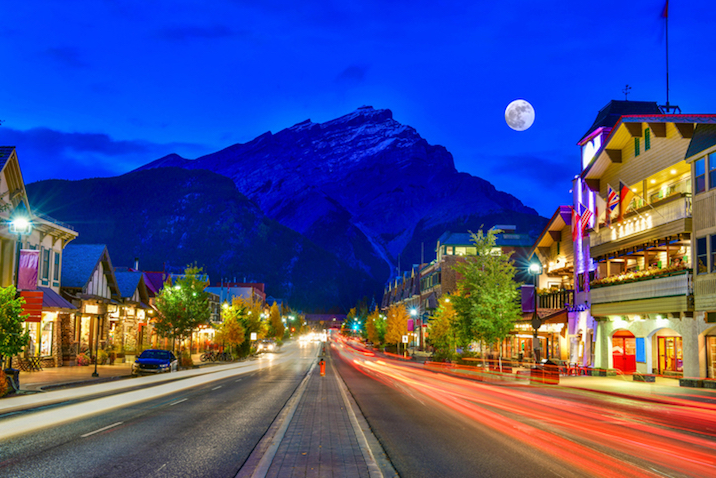You are here
Home 🌿 Recreational Marijuana News 🌿 Alberta attracts millions to its pristine wilderness. So why isn’t cannabis tourism flourishing? 🌿Alberta attracts millions to its pristine wilderness. So why isn’t cannabis tourism flourishing?

Last spring, Darrin Zeer invited a handful of guests to his cannabis-infused yoga retreat in Alberta’s Bragg Creek, nestled in the foothills of the Canadian Rockies just west of Calgary’s metropolitan hum.
The Alberta-born, Colorado-based yoga teacher and mindfulness expert is accustomed to offering cannabis samples at his retreats. But this one was different: Those who attended his Bragg Creek event had to bring their own weed. And even though cannabis for recreational use became legal in October of 2018, facility managers were also hesitant to host the event — guests weren’t given its address until after they registered.
Even in Alberta, one of the most liberal provinces in Canada for cannabis use, legalization hasn’t sparked a successful wave of cannabis tourism.
“The openness is happening, but somehow, canna-tourism hasn’t taken off,” Zeer explained. “I think resorts are still afraid that they’ll get stigmatized as ‘the weed hotel.”

Darrin Zeer, right, teaches a mindfulness class.
Alberta draws millions of tourists a year through sites such as Jasper National Park, the Alberta Badlands and Kananaskis. Grabbing a joint or two for the trail is also fantastically easy: Alberta has more than 300 legal cannabis stores serving a population of just under 4.5 million people. But weed simply isn’t luring tourists into the province.
The consumption conundrum
For starters, there isn’t a guarantee that tourists can find a place to light up during their travels in the region. National parks and Alberta provincial parks allow visitors to consume cannabis within certain restrictions, but the province’s municipalities are allowed to tighten those rules even further. Banff is one of them. Smoking or vaping cannabis in public is prohibited across the entire town. The same goes for the city of Calgary (although Edmonton allows for public consumption in areas where smoking is permitted).
Ski resort management seems particularly turned off by the idea of toking visitors. In the weeks after Canada launched its first wave of nationwide legalization, Sunshine Village and Nakiska Ski Area — two major resorts near Banff — banned cannabis use anywhere on their properties, including chair lift lines and public areas. A Sunshine spokesperson said they don’t intend on relaxing the facility’s pre-existing smoke-free environment policy any time soon.
“As we are a family-focused resort, we do not foresee changes to our policy,” they wrote in an email to The GrowthOp.
Alberta isn’t alone. Cannabis tourism isn’t terrible viably anywhere, according to Christopher Nicholson, president of the Canada West Ski Areas Association, which represents ski resorts across western Canada. He’s attended presentations about it from representatives of U.S. jurisdictions such as Colorado, a state with both legal weed and a strong tourism sector.
“The presenters said across the board: It wasn’t what we thought it would be,” Nicholson said.
Entrepreneurs at the ready
The regulations and hesitancy from some companies aren’t preventing some entrepreneurs from trying to forge ahead.
The organizers behind TEN7TEEN, a cannabis experience company, run weed-themed tours in both Calgary and Banff, including events called ‘High Hikes.’ They also run large events and art displays with collaborators, Smoke & Show. Steve Mix, founder of TEN7TEEN, said Alberta has one of the best tourism industries in Canada. Between the province’s mountains and other attractions, his company has been able to offer a fairly wide range of activities.
While TEN7TEEN can’t sell cannabis as part of their tours, their activities allow cannabis sellers access to customers in a way that’s difficult to do in Canada’s industry thanks to advertising restrictions. Mix said their methods allowed them to weather an over-saturated cannabis market.
“The traditional way that a lot of these tourism companies have been set up maybe hasn’t been as profitable as they would have seen,” Mix said. “But I think the way that we’re doing it is very sustainable.”
National tour company awaits regulatory shift
Still, major metropolitan centres outside of Alberta are soaking up the majority of Canadian cannabis tourism. Vancouver has always been a weed hotspot. But Matt Cronin, founder and CEO of Canada High Tours, said Toronto attracts more guests than any other spot on their list — many of whom arrive from the United States or Europe.
The online tour company doesn’t currently offer tours in Alberta, but they’d be open to the possibility if general interest rises in the region. Cronin said in an email they’d probably focus on the Lake Louise and Banff areas “when the time is right” — although restrictive cannabis use laws will play a factor.
“We won’t offer experiences in cities, towns or municipalities where it’s banned for public consumption… where there are restrictions I doubt you’ll see much cannabis tourism,” he wrote.
420 Intel is Your Source for Marijuana News
420 Intel Canada is your leading news source for the Canadian cannabis industry. Get the latest updates on Canadian cannabis stocks and developments on how Canada continues to be a major player in the worldwide recreational and medical cannabis industry.
420 Intel Canada is the Canadian Industry news outlet that will keep you updated on how these Canadian developments in recreational and medical marijuana will impact the country and the world. Our commitment is to bring you the most important cannabis news stories from across Canada every day of the week.
Marijuana industry news is a constant endeavor with new developments each day. For marijuana news across the True North, 420 Intel Canada promises to bring you quality, Canadian, cannabis industry news.
You can get 420 Intel news delivered directly to your inbox by signing up for our daily marijuana news, ensuring you’re always kept up to date on the ever-changing cannabis industry. To stay even better informed about marijuana legalization news follow us on Twitter, Facebook and LinkedIn.




